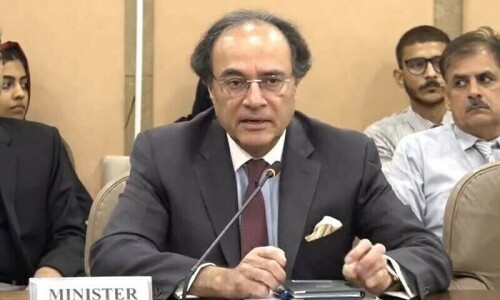• Claims efforts underway to bring untaxed sectors into tax net
• Assures business community of relief within IMF framework
KARACHI: Finance Minister Muhammad Aurangzeb has said the increased taxes, especially for the salaried class, are a temporary measure, albeit a challenging one, and assured that efforts are ongoing to bring previously untaxed sectors into the tax net.
“Taxes are raised for business community and salaried class this year, but we cannot do it again and again as they all are excessively overburdened. Therefore, all other untaxed sectors, including retailers, agriculture, real estate sectors, etc., have to be brought into the tax net to reduce burden on existing taxpayers,” he said while appreciating all the chief ministers for agreeing to bring in legislation for taxing the agricultural sector which is currently a provincial subject.
“While remaining within IMF conditions, what possible relief is necessary will be given to the business community,” the minister said during a meeting with the business community at the Karachi Chamber of Commerce and Industry (KCCI).
He expressed concern that the warehousing sector was not given the status of industry despite the prime minister’s directive. “I will review this matter and analyse barriers in this regard.”
Mr Aurangzeb said efforts are being made to attain macroeconomic stability for sustainable growth because if the government, without attaining macroeconomic stability, takes growth-oriented steps which were done in the past, it would face a balance of payment issue.
There was no choice but to take difficult decisions for macroeconomic stability which, when achieved, would reduce the burden on the business community as well as the salaried class, he added. He said the economy was facing structural issues as whenever attempts were made to accelerate growth, it caused a balance of payment problem.
Terming the 100 basis points cut in the interest rate a good step keeping in view the inflation, he said even if it goes up to some extent, the State Bank will still have enough room to gradually bring down the policy rate further.
In addition to high interest rates, he said, the business community suffers badly due to high taxes and energy tariffs which have all come together, but the government is cognizant of all these issues.
Referring to his discussions with banks, the finance minister said they have been advised to give maximum lending to the private sector, particularly the farmers and SMEs who have to lead the country. Credit has to be provided to the private sector on a cash flow basis, not on collateral basis which was being done by several banks whereas the other banks must also do the same, he added.
Mr Aurangzeb said all determined tax refunds of Rs51bn up to June 30, 2024 were released to the industries on July 1 and after addition of duty drawbacks, the overall refunds would go up to Rs70bn.
On reports regarding numerous free-of-cost facilities being provided to ministers, he said: “I want to make a very categorical statement that I don’t take salary and I along with all the ministers present at KCCI today pay our bills from our own pockets. At least at the federal level, we have to reduce our expenditures.”
Corporate farming
Finance Minister Aurangzeb emphasised the importance of corporate farming, in collaboration with the Special Investment Facilitation Council (SIFC), to accelerate economic growth, APP adds.
Addressing the Executive Committee of the Pakistan Banks Association (PBA) at Islamic Chamber of Commerce building, he said it was encouraging to see the private sector taking proactive steps in advancing financial and technological infrastructure.
The minister also emphasised the importance of public-private partnership, particularly with HBL and NBP, stating that “we need to create capacity and move forward”.
Published in Dawn, July 31st, 2024















































